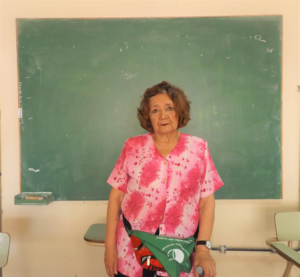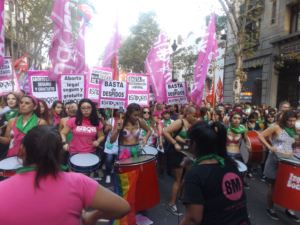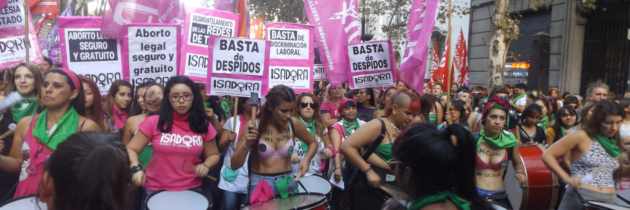Legal abortion in Argentina: A fight for civil rights
Originally published on The Wry Ronin on March 2019.
Today, civil rights are taken for granted in a lot of countries, from the right to vote, to equal pay or parental leave, however, even today, hundreds of women in Latin America are fighting to have the right to decide what happens to their bodies.
During decades, Argentina’s society has been divided in regard to the approval of abortion. A side that wants to be recognized as autonomous and independent the other side that wants to keep a law that was passed in the year 1921.
Maybe some numbers can help us to get a better idea of what Argentinean women are fighting for:
- In 2005, according to the Ministry of Health, approximately 54 abortions are performed per hour, that is, 1300 abortions per day. Between 370.000 and 520.000 abortions are induced annually.
- Deaths from unsafe abortions in Argentina represented 17% of total maternal deaths between 2014-2016.
- 2 out of 10 of the women who died due to maternal causes died from unsafe abortions: 47 women per year.
The need for an update
The law that is currently in force was approved in the year 1921, there the article 86 of the Argentine Criminal Code states: “(…) Abortion by a doctor with the consent of the pregnant woman is not punishable:
- If it has been done in order to avoid a danger to the life or health of the mother and if this danger can not be avoided by other means
- If the pregnancy comes from a rape or from an attack on modesty committed on an idiot or demented woman. In this case, the consent of the legal representative must be required for the abortion.”
Back then, the causal regime was very flexible. However, since 1960 almost all European countries, United States, Canada, Australia, China, South Africa, Uruguay, among others have improved this model and adopted a system that respects women’s rights.
Since then, women have come a long way. When that law was approved, almost 100 years ago, women did not have the right to vote, nor did they integrate Congress. Neither did they have full disposition of their property, nor the patria potestas of their children.
An update of this law is necessary so that women can fully exercise their rights in this century.
Even the words used in this law are outdated and could lead to misunderstandings in the world we live today.
Years of struggle
Its system to communicate and disseminate is very organized and covers all aspects: rallies, massive activities, screening of documentaries and every kind of activities that allow women to know their rights and what to expect from the State and the laws.

This fight was started by women as Dora Coledesky who died in 2009 but who started to criticize the current law in the 80’s. Today, her granddaughter Rosana Fanjul, continues her legacy.
With Dora, there were women as Olga Cristiano who explained us how was the fight before. Today she’s 88 years old and she describes herself as “fighter and feminist”. She goes to every rally arranged by Campaña Nacional por el Derecho al Aborto Legal Seguro y Gratuito1 (National Campaign for the Right to Safe and Free Legal Abortion).
In her younger years, talk about abortion was impossible, not even with your close family. In the movement she started with Dora, the meetings were held in borrowed places and in secret.
Olga states that part of her legacy will be “a society that accepts diversity as something natural”. When asked about what has been learned in these years of struggle, she goes straight to the point: “fighting for the impossible only costs a little more”.
Today
Currently the fight is not only for legalization, but also for decriminalization. Current law states that the woman that decides to abort and the health professionals that help her must go to jail. This needs to change.

Why free? In Argentina, like many other countries in Latin America, the health system is public and free. There are private hospitals, however, those that are open to the entire population are the public ones. These are accessible to all citizens, regardless of their nationality or immigration status. Decriminalizing abortion does not guarantee that it is accessible to all women, its access would be restricted to the economic limitations of those who need it.
Since 2005, every year there have been massive demonstrations in the streets across the country led by women who have been organized to draft a law that decriminalizes abortion and provides tools to deal with unwanted pregnancies.
In 2018 the proposal of law was endorsed by 72 deputies. At the time, this proposal was not approved as law by parliament.
This year the challenge is even greater, not only there are parliamentary elections, but also presidential ones. It is feared that the electoral agenda will shade the discussions related to the law of decriminalization of abortion.
2018 also brought another change for the law, the National Campaign for the Right to Legal, Safe and Free Abortion made some modifications:
- It changed the subject of abortion, not only for adolescents and women but “pregnant people” demonstrating an advance related to gender identity.
- Conscientious objection was eliminated, which means that no health professional could refuse to perform a legal abortion on the grounds that it goes against their religious principles. If it is legal, they must do so with the protocol established by law.
For Argentinean women the struggle continues, on their agenda, there are organized rallies, academic meetings and similar activities that keep them focused on their goal. Will it be approved this year? We don’t know yet, but what’s sure is their conviction to keep fighting for women’s rights.
❤️Thank you for reading this far!
🔀 Do you think this article can be of help to you or someone you know? Share it!
💸You could also support me through Paypal or Binance.
✨ You can also support this project with items from this Amazon list.
🧠 Do you need advice related to Communication or Marketing Analytics? Check out my Brain-Picking Session.




